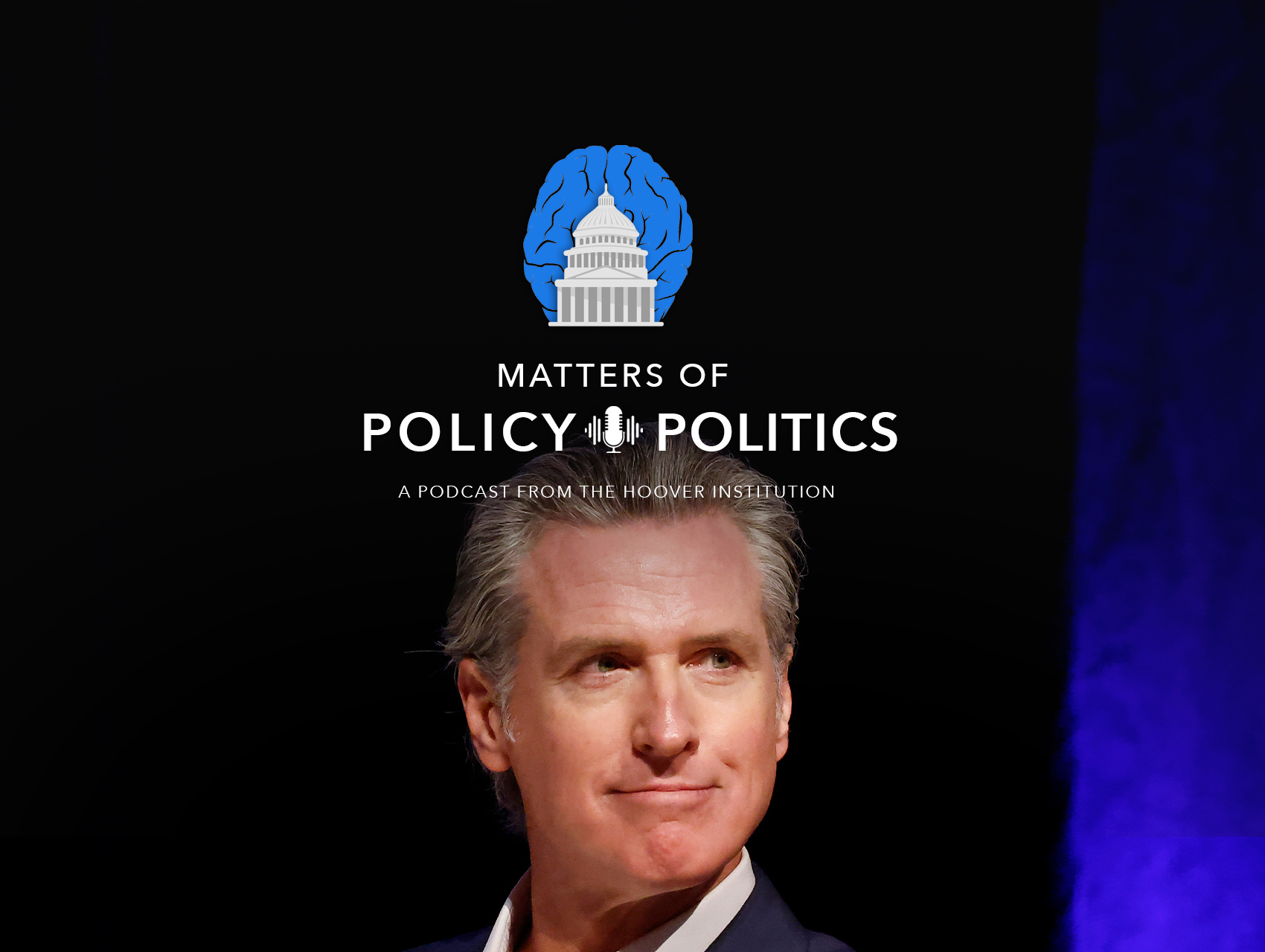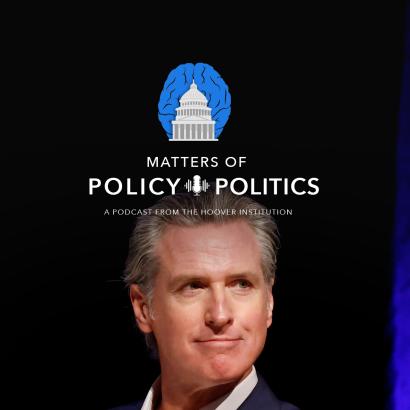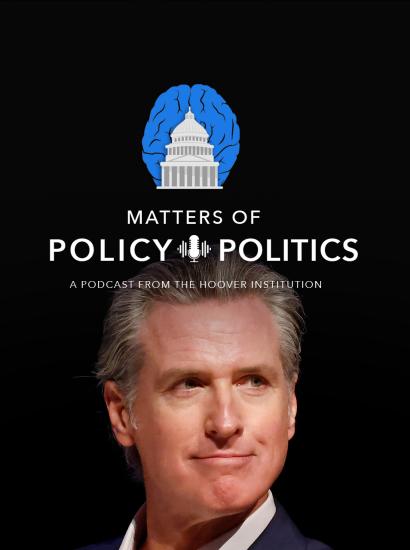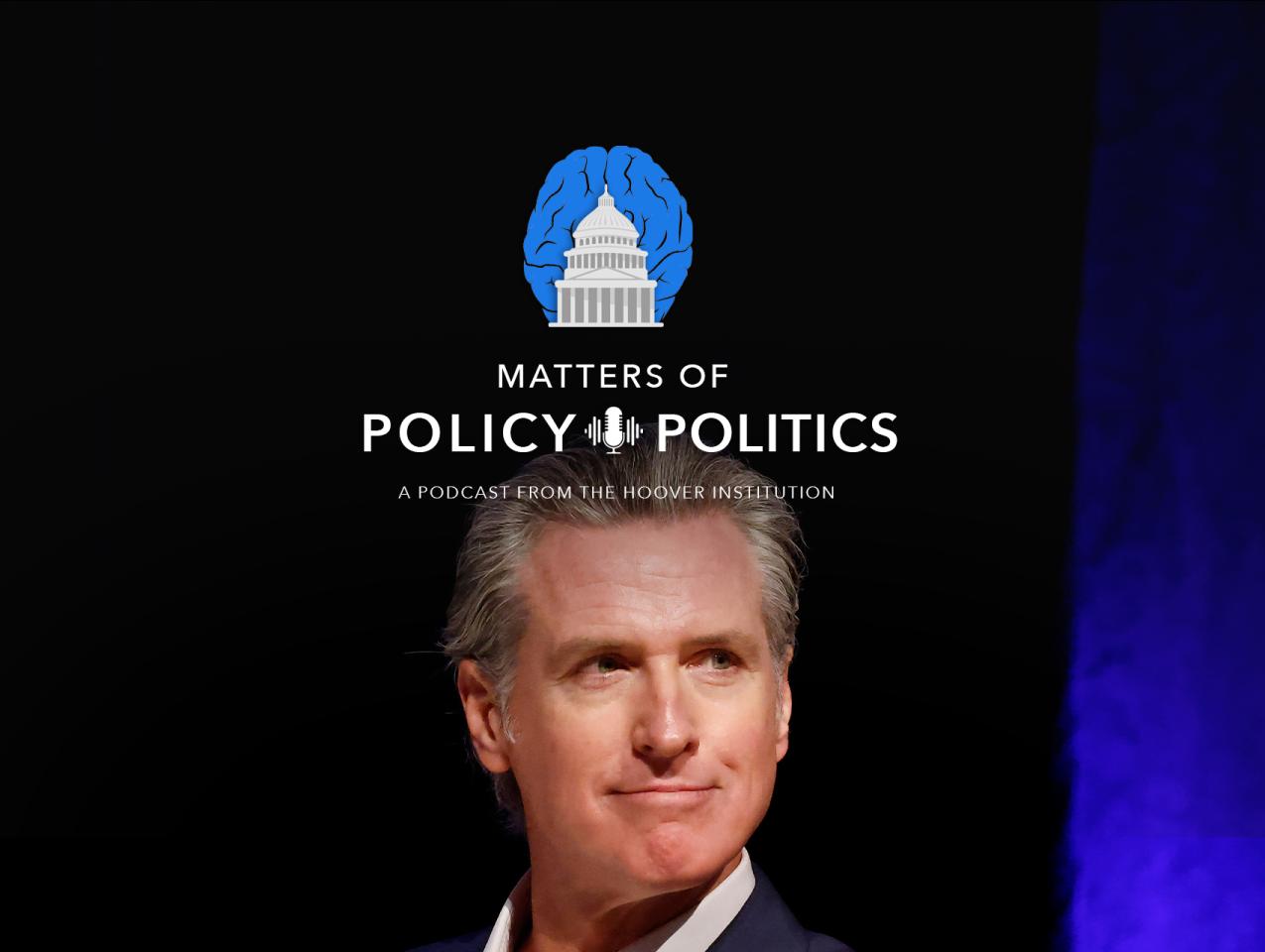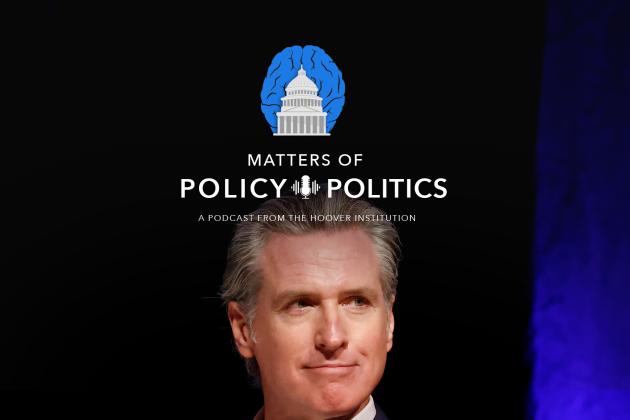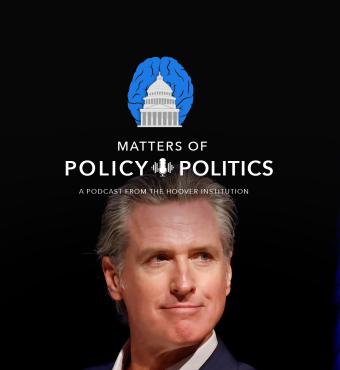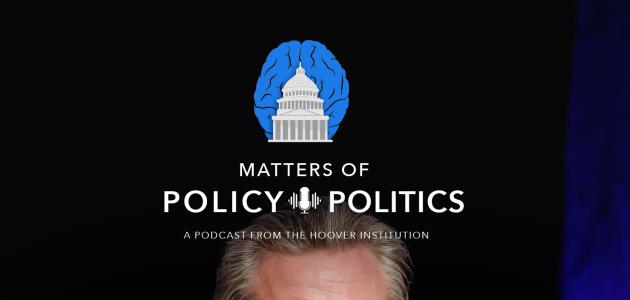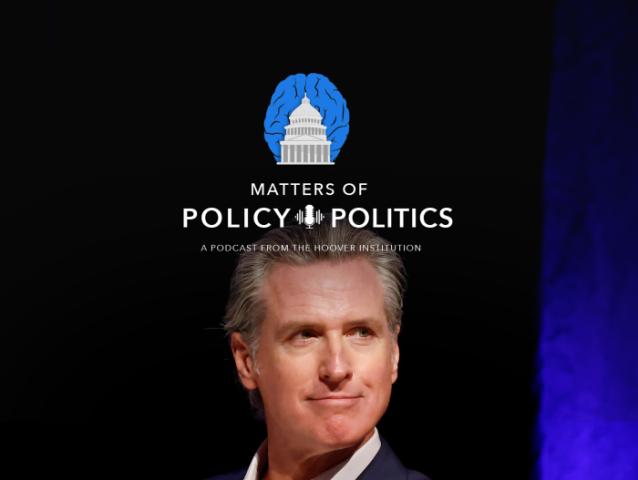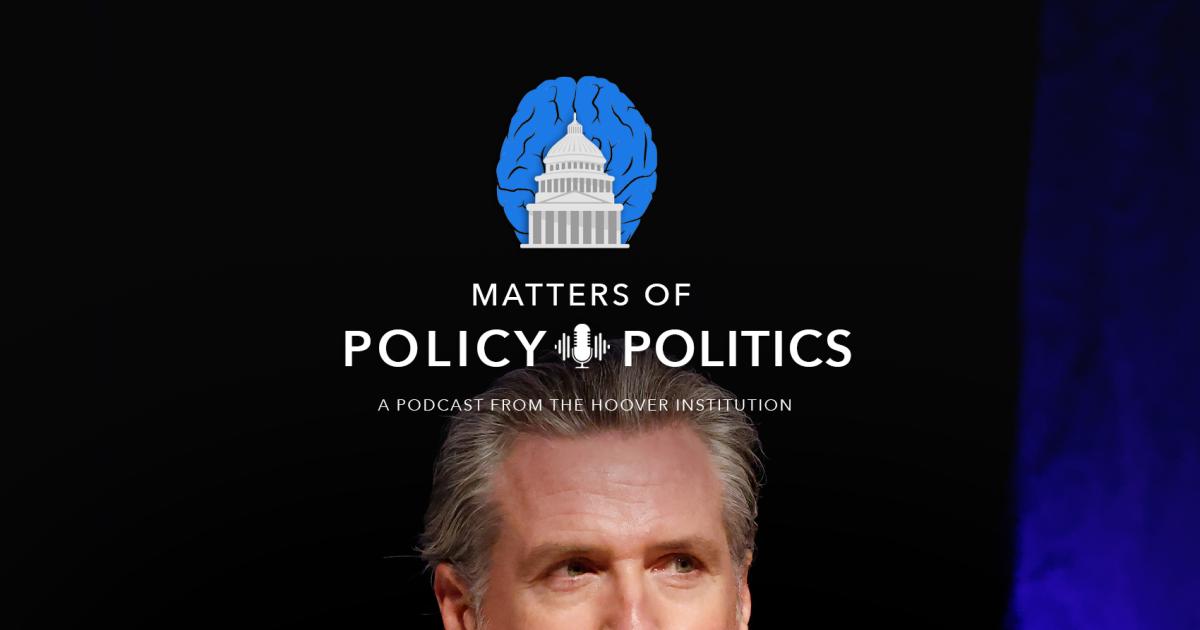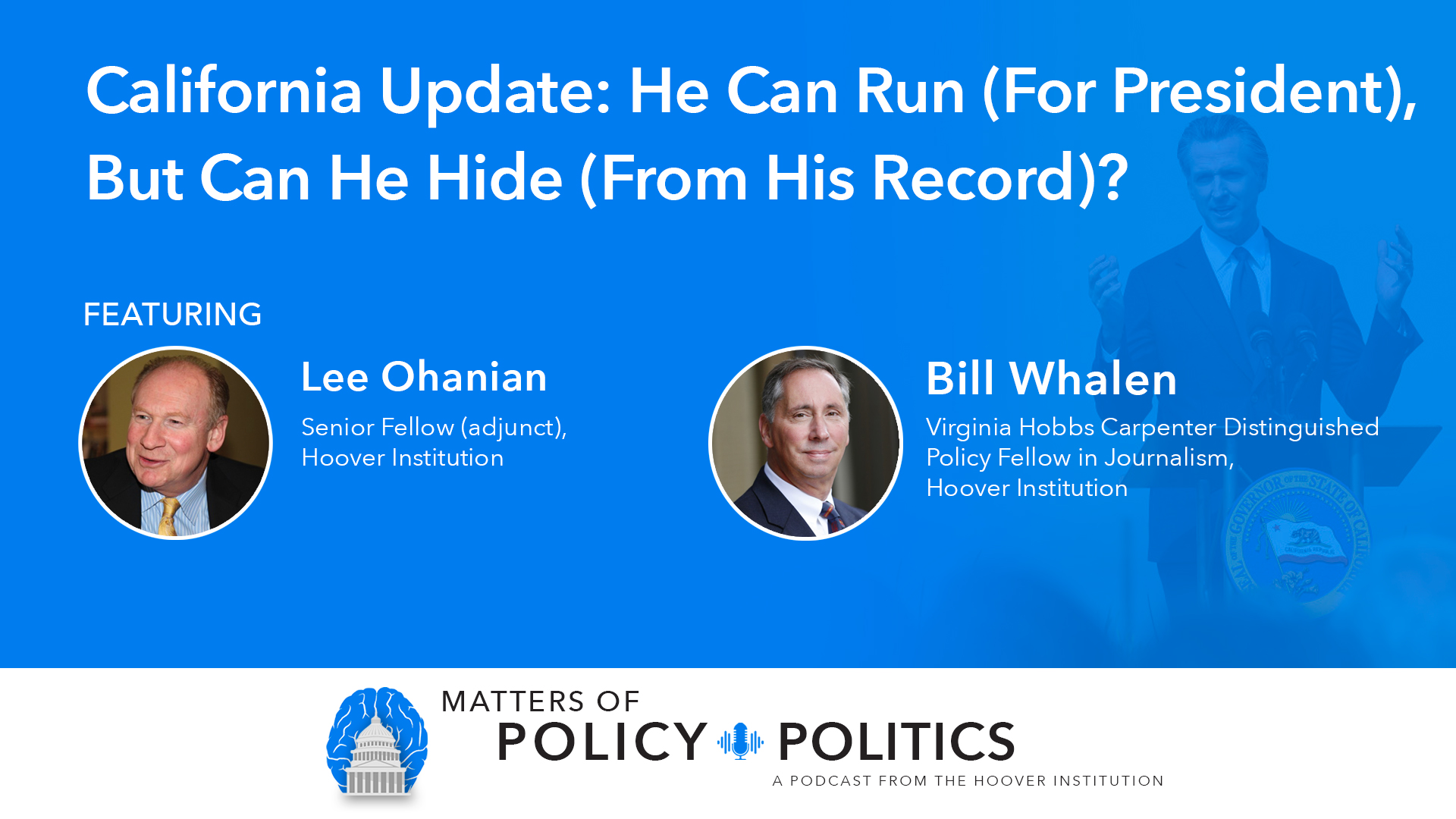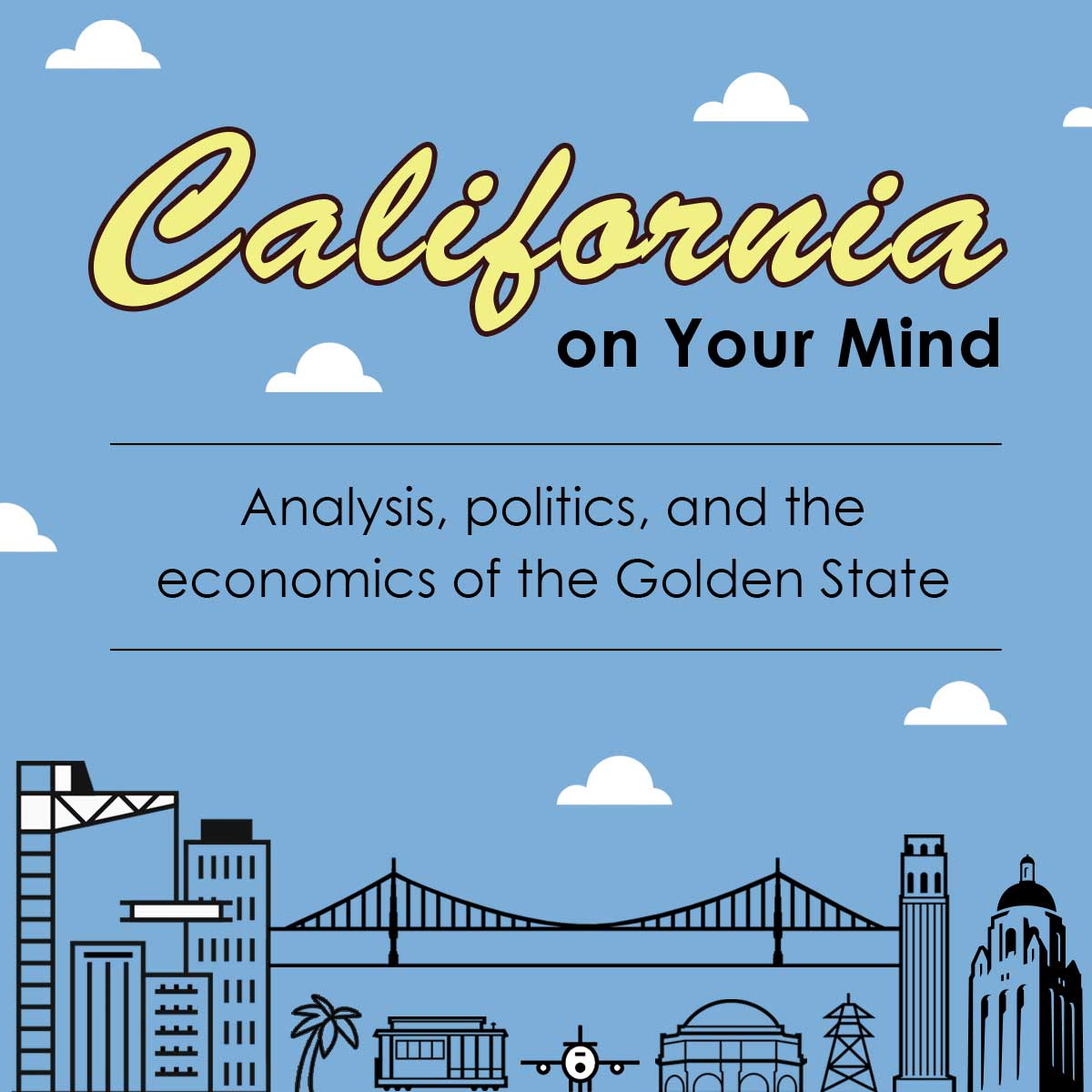- State & Local
- California
- Empowering State and Local Governance
California Gov. Gavin Newsom’s recent visit to early-primary South Carolina, followed by his return home and hinting at a special election to re-politicize California’s redistricting process in order to add more Democratic seats in Congress (as a counter to Texas’ legislature doing the same to pad the present House GOP majority), seems further evidence of the term-limited governor’s president ambitions. Yet as Newsom’s South Carolina experience showed, wherever he journeys, he also brings along the Golden State as political baggage.
Hoover senior fellow Lee Ohanian and distinguished policy fellow Bill Whalen, both contributors to Hoover’s California on Your Mind periodical, join Jonathan Movroydis to discuss the latest in the Golden State including where Newsom stands as far as delivering on lofty gubernatorial promises with less than 18 months remaining in his second and final term, as well as how that record on such thorny policy matters as homelessness, new housing and high-speed rail construction might impact his presidential prospects.
Recorded on July 21, 2025.
WATCH THE EPISODE
>> [MUSIC]
>> Jonathan Movroydis: It's Monday, July 21, 2025, and you are listening to Matters of Policy and Politics, a Hoover Institution podcast devoted to governance and balance of power here in America and around the free world. I'm Jonathan Movroydis, and I'm sitting in the chair of Bill Whalen this morning, the Virginia Hobbs Carpenter Distinguished Policy Fellow in Journalism, so that he can answer questions and provide commentary about California policy and politics in which he's well versed.
Bill Whalen, in addition to being a Washington Post columnist, writes weekly for How Hoover's California on Your Mind Web channel. Whalen is joined today by Lee Ohanian, a Hoover Institution Senior fellow and professor of economics and director of the Ettinger Family Program in Macroeconomic Research at the University of California, Los Angeles.
Ohanian also writes weekly about the policy environment of the Golden State for California on Your Mind. Good day, gentlemen. How are you doing?
>> Bill Whalen: Good.
>> Lee Ohanian: Good to see you fellas.
>> Jonathan Movroydis: You too. Let's talk about the latest developments in policy and politics in the Golden State. The Texas Tribune is reporting that, quote, Texas Democrats in Congress have sharply criticized President Donald Trump's plan to redraw their state's political map in the middle of the decade, labeling it as a democracy.
In response to these plans, Governor Newsom tweeted out on X Trump said he's going to steal five congressional seats in Texas and gerrymander his way into a 2026 win. Well, two can play that game. But for Newsom to gerrymander California's electoral map, he would require a ballot initiative to undo independent redistricting, which is an accomplishment of Arnold Schwarzenegger that the governator likes to tout.
Bill, can you take us through what such a move would take on the part of Governor Newsom? And would it come with any political backlash?
>> Bill Whalen: It would be a huge roll of the dice, Lee and Jonathan, in this regard. Newsom did say two can play this game.
But you're right, California cannot exactly play the game. The legislature alone cannot do this. Legislature can do one of two things: Jonathan can either pass a constitutional amendment because you're ultimately amending the Constitution to undo two ballot initiatives which created the independent redistricting process in California. You would then have to call a special election.
The time of year gets curious because you cannot do a special election until 131 days after the legislation has been approved but you would have law makers running in a March primary and what would have to be redrawn districts if this happens. So you're talking about a special election later this year, post haste if you will.
Or they could just pass a simple bill and let the courts decide, hope that a, you know, friendly judge would see their way. But the special election would be the outcome here. It's a roll the dice in this regard, special elections are always tricky for governors. I can take you back to Ronald Reagan, who tried one in 1973.
I believe it was Proposition 1, which changed taxes in California. He got skunked. Arnold Schwarzenegger did a special in 2005 for reforms he wanted. He got skunked as well. So Newsom would have to roll the dice that the voters would be in the mood for this. He would probably run a foul of Arnold, who I don't think would sit by idly when one of his accomplishments was being played with here.
But I've come to this rather cynical conclusion, Lee, and I'll let to get your thoughts on this, I think if Newsome holds a special election, he probably wins regardless in this regard. Either he prevails at the ballot and now you have changed redistricting and put it back in the hands of a Democratic legislature.
And in theory he would more Democratic seats, so he wins that way. Or Lee, he wins by losing in this regard. National Democrats would love for Gavin Newsom to do this. He's been talking to Hakeem Jeffries, the House Democratic leader, about this. They would love to see him fight the good fight.
And if Newsom is indeed running for president in 2028, even though he would suffer a setback in California, it would be embarrassing to lose the election. He would still get brownie points with Democrats nationwide for doing this. So, Lee, I very cynically would suggest this is a win win for the governor.
>> Lee Ohanian: Yeah, Bill, I agree with you regarding redistricting. I think the state's media would be, would be very negatively disposed about this. And it is a media that's largely left center or left of left of center, but I think that, but yeah, the Democratic National Party, I think, would be delighted to have Newsom take one for the team.
His approval ratings have increased very recently as he has been clashing with Trump as a California. I would like Newsom to not to get so triggered by what the President says, because he's got a big job to do here at home. But, but it's paying off for him from a public relations standpoint, which will just further incentivize, I think, this kind of behavior.
But yeah, I, I, I, I agree this could play into his hands. I don't think it will go anywhere and perhaps at this point he probably doesn't really care if it doesn't go anywhere.
>> Bill Whalen: Yeah, no, the campaign, the special election would line up real simply, Lee and Jonathan in this regard, Newsom, backed by special interest, would make this a referendum on Donald Trump.
They would say, look, Donald Trump is behind the power grab in Texas. Don't you know, California is immune to this. Punish Donald Trump by doing this. So Trump, Trump, Trump. And maybe that's a good message in a state that barely where Trump has not won 40% in a presidential election.
But, you know, the problem would be the pushback in terms of the likes of Ron getting involved, I presume, at some point. But one other thing, Lee and Jonathan, Gavin Newsom as governor has not been a very good ambassador for ballot initiatives. Remember, he was a very public face behind Proposition 13 back in 2000.
It was a $15 billion education bond, it lost, and education bonds rarely lose in statewide elections. In 2024, Newsom comes along in the primary and is the very public face of Proposition 1, which is the anti homelessness initiative. And as you remember, Lee, it takes weeks for the ballots for the votes to be.
It gets by the skin of its teeth. So there's an argument to be made that the more you see of Gavin Newsom in terms of championing causes, the more it affects the policy itself. So I'd be very curious just putting on my strategist hat to see how Newsom would sell this without making it a vanity project.
But at this point, given that he seems very determined to run for president and he's not shying away from any publicity, I think you'll see his face a lot on tv, and I just think that could be a problem for him.
>> Lee Ohanian: Yeah, it's interesting, Bill, you brought up the issue about the additional funding for homelessness.
I think only about six weeks, perhaps eight weeks before the election, polls showed that was winning by 2 to 1 and it barely cleared 50%, maybe 51, as I recall. Yeah. And that was the governor's poster, poster child. Yeah, he went to the mat on that, and it didn't look like, it looked like he was not positive value added for that, for that vote.
But what's interesting is that he seems to be reclaiming his image nationally. But among those who know him best, California is where he's been governing for what, six, six and a half years now. His approval regarding issues is. Is not particularly high. You know, we'll get into some of these ideas over the next 45 minutes or so, but there is homelessness, there is housing There is high speed rail.
There is the lack of funding for Proposition 36, which was the crime initiative. Those who live in California still have substantial concerns about the governor, but perhaps nationally he's doing better.
>> Bill Whalen: Yeah. By the way, you mentioned the media. This is very interesting to watch, the media ordinarily are behind most things Gavin Newsom wants to do.
But in this case, there was a recoiling against the idea of fiddling with redistricting. There's a very interesting column by Mark Baraback, who rights for the Los Angeles Times and he took Newsom very hard to task for this. And they're saying that number one, do you really want to mess with the system that took Registrar out of the hands of politicians?
But then he made a point. We'll get to this later in the podcast. He said there is a fundamental challenge to Gavin Newsom should he run for president. And then that he has this long track record of big promises, but he doesn't deliver at the end of the day.
It creates awareness on the part of voters as well. So again, just doing a special election, it's a roll of the dice because it's a turnout model is always curious. It's not a regular election, so you don't know who's gonna turn out to vote. You don't know what the mood of the public will be vis a vis Trump.
If there really is a lot of kind of wind behind the sale of going after Trump this way and voters just might decide, this is just a bridge too far for us. But again, the Seneca me thinks that if you are running for president, you're doing what you can to show that you are decidedly anti Trump.
You will fight at the drop of a hat, this is yet another way to go about doing it. Even if it's time consuming, painful, it's gonna cost taxpayers money in California.
>> Jonathan Movroydis: Gentlemen, staying on Governor Newsom, he has evidently taken a page out of President Trump's social media playbook.
Last week he posted a picture of Trump with the infamous Jeffrey Epstein and he trashed Transportation Secretary Sean Duffy as quote, the guy who can't keep planes in the sky after the administration announced that it would be taking $4 billion away and unspent high speed rail money. He also called Texas Attorney General Ken Paxton dude and corrupt after Paxton criticized Newsom as hypocritical for his scrutiny of ICE enforcement, even though a few years earlier Newsom deployed law enforcement to enforce COVID 19 restrictions.
Gentlemen, is this brash style the new path to the White House? Is this Persona unique to Trump or after a decade of Trump, is this becoming a tired old act, Bill?
>> Bill Whalen: Yes, you could say imitation is a sincerest form of flattery. And he's decided that Trump is basically kind of insult comics his way to the White House, I can do it too.
I am a old school person when it comes to politics. I hate when politicians resort to this kind of behavior. He has a rapid response team that goes on the Internet and is at all times going after politicians in other states and the Trump White House and so forth and jumping onto any and all national news, if you will.
The problem I have with this is simply it's sophomore and it's at times beneath the dignity of the office, I think, to do some of these things. But on top of that, Lee, from just a political standpoint, politicians are like prize fighters, if you will, and you punch in your own weight class, if you will.
So when Gavin Newsom goes after JD Vance as he did the other day because Vance was bringing his family to Disneyland. Okay, I'm kind of childish to go after him for going to Disneyland, if you will. But the vice President, United States is in his punching class, if you will.
They're kind of equal weights if you will. It's when Newsom is going after the likes of Nancy Mace, the congresswoman from South Carolina, getting into fights with her. Nancy Mace may never run for statewide office in South Carolina. She will not be a governor, in all likelihood. Even if she ran for president, it would be a gadfly operation.
She's not in the same political class as Gavin Newsom, and yet he seeks to engage with her simply to get attention, if you will. So it's the punching down, Lee, that I really don't like about this. Just stay in your own class weight, Governor.
>> Lee Ohanian: Yeah, interesting point, Bill.
The lack of civility in today's politics, I mean, I really despise. I don't understand why the governor is doing this, particularly with regard to relatively anonymous people on social media who take issue with him or take issue with California who might post statements on social media that are inaccurate.
There's no one cares, no one cares about this. Literally zero. I don't see Andy Beshar, who's a very popular Democratic governor in Kentucky, I don't see him doing that. You see the stories coming out of Beshar's office being very positive ones of accomplishments and achievements and where the state is heading to.
And Beshar is a Democratic governor in a largely republican state. I think politicians on both sides could learn a lot from. Could a lot learn a lot from him or Vermont Governor Bill Scott, who has, I think, the highest approval rating of all governors right now in the United States.
Very popular in Vermont now, tiny state, yes. But there's a sense of leadership that comes with taking the high road and letting actions speak for you rather than getting into gutters. And the lack of civility does really bother me.
>> Bill Whalen: Well, I assume Lee, the governor and his advisors have come to two conclusions.
One, they look at the Democratic primary field in 2028, and they think what Democratic primary voters want, and they want a fighter. They want somebody who's going to be tough, if you will. So I guess they think that going on the Internet like this and making nasty social media comments is tough, if you will.
But secondly, I think they view it as addressing a core problem with Democrats. We had a panel of pollsters here at Hoover a couple months ago. And what they talked about is really interesting, they said the Democratic Party at all had two problems in the 2024 election. One was the perception of wokeness, and the other one was the perception of weakness.
And so I think maybe this is Newsom's way to counter perceptions that he's a beta male, that he is not sufficiently tough by tough language. You see this in his interviews. In his interviews, by the way, when he says words like dam and hell and shows real outrage and things like that.
I think they believe it's kind of a tough guy image, if you will. And I just don't know if Gavin Newsom's the right guy to pull off toughness. It's hard to be kind of this good-looking kind of, well, coiffed guy from Marin county all of a sudden be the tough guy.
>> Lee Ohanian: Well, yeah, the tough guy who grew up with, really, I mean, de facto, an enormous amount of privilege. His early businesses were funded by the Gettys because of his dad. He had tremendous connections, including Chuck Schwab. There's a sense in which he is not to be pejorative, but he is as elitist as it gets.
And I'm not using the term elitist pejoratively, but he is part of that group of people who are very, very wealthy, who make a lot of important decisions regarding California politics, regarding California commerce, hiring, investment. That is his circle. And it's hard to see him go on podcasts and sort of be the second coming of Clint Eastwood.
Newsom, at the end of the day, I know, Bill, I'm interested in what you think about this. I mean, from my standpoint, politicians are remembered by what they accomplish. Newsom has always prided himself on being a politician of ideas. And that goes back to his time as mayor in San Francisco.
I think perhaps his most striking accomplishment as mayor in San Francisco what was it, the 4,000 marriage licenses to same sex couples. That proved to be far ahead of his time. I mean, many states followed up on that. I think he will be remembered for that. But at the same time, as mayor of San Francisco, he promised to end homelessness by 2014.
He had these kind of off the wall ideas. I think I remember reading the San Francisco Chronicle about homeless meters. They would be like parking meters, except you would put your change into a homeless meter. That would go to a nonprofit that was serving the homeless or those with substance abuse.
Politicians remember for what they actually implement. It's not the ideas, it's what they actually achieve. And what was it, 21 policy papers. 20 policy papers when he was San Francisco mayor. That's not what an American politician gets rewarded for, it's what would you actually implement and what you actually achieve.
>> Bill Whalen: Yeah, it's always a tricky thing in politics to try to steal somebody else's act. And so I thought that, well, if Donald Trump can go on social media and just blast people all day long, why can't I do it, too? Well, Trump, as we've seen for the past decade, now has a certain, shall we say, Teflon about him now, granted, the Jeffrey Epstein thing is testing the different.
Durability of that Teflon. But Trump still gets away with stuff other politicians can't. And this is the danger. If you decide to play the same social media game as Trump. You live by the sword. There's a potential to die by the sword. And by that, I mean you have these towel snapping, snarky aides who are doing rapid response.
At some point, somebody's going to go too far. A good example is Stephen Miller, the Trump aide who Newsom goes after as well. Another example of punching down the governor of California. Why bother with the White House aide? He's just small potatoes compared to you. But Newsom's gone after him in very hard terms.
At some point it's going to come across as a threat and before you know it, the Justice Department's going to be looking at your operation saying, what are you doing as well? So I just wish the governor would kind of throttle it back on the social media. I understand the tough Persona.
I understand you want to play this game. I know the Democratic primary voters like it. But for goodness sake, you're the governor of the largest state in America, show a little dignity, sir.
>> Lee Ohanian: Well, he's, he's six and a half years into being governor. There's, there's not much time left.
You know, if you thought about a signature achievement, I think he's, I think he's still looking for that. I do love the governor for, applaud the governor for the fact that he has helped bring clean water to many rural, very, very poor communities. That flies under the radar in a lot of media stories.
That's probably not going to be a signature achievement, but all the potential signature achievements. There was the Marshall Plan on housing, there was ending homelessness. There was high speed rail. There was just a laundry list of things that were supposed to be achieved. There's a year and a half left or so.
Let's hope that he kind of gets to some of that and makes some more headway because right now, just uncivil talking to anyone and everyone who's being critical of California. I just don't think it's helping out Californians very much.
>> Jonathan Movroydis: Lee, can we grade the governor's, his legacy on each of these points that you just raised?
Can he, can he right the ship on high speed rail? Can he make lemming, you know, lemonade out of lemons or it's too little, too late. You know, you talked about the, the homelessness issue. He Called it a moral issue that we must confront. In a state of the address, as you mentioned, he declared a Marshall Plan on housing and promised 3.5 million new homes by 2025.
On these two specifically, can he right the ship? I mean, there was a recent announcement for CEQA reform by the state legislature and the idea that we can make these reforms and speed up new housing. There was a recent report over the past two years homelessness actually went down in California.
How can we rate Governor Newsom and can he right the ship and you know, run on any sort of accomplishments if he chooses to run in 2028?
>> Lee Ohanian: Well, high speed rail is going to be very, very difficult because right now we only have the focus for high speed rail right now is on a, is on the line between Bakersfield and Merced.
>> Bill Whalen: Right.
>> Lee Ohanian: The Inspector general, which is the, which is the group who have oversight and accountability responsibility for California high speed rail have indicated, I believe the quote was something like it will be unlikely that it will be finished by 2033. So best of case scenario is that, is that he leaves office in 2028 and we're still a minimum of five years away from high speed rail on a line that no one ever voted for.
2008 was when we issued the 9.95 billion bond. I was supposed to connect LA to San Francisco. The regional completion did, I believe, was around 2020. I believe the original budget for LA to San Francisco was $33 billion. That in and of itself was a mistake to push on the taxpayers who voted for that because that was quoted in $2008.
Not as, as I recall, not the dollars that would have to be paid out over time. So what's happened is that the price of high speed rail has enormously out. I think in 2019, the governor said in the state of the state speech, he said, you know what, it was a fine idea, but we just don't have the money to get from here to there, meaning LA to San Francisco.
But he said, but you know, we can get from, we can get from Bakersfield to Merced and you know there's just, just step back and think about that for a second. That line might cost 38 and a half billion dollars. That's the upper end of estimates right now that the numbers are kind of 35 to 38.5 billion on a trip that's, you know, it's 160 miles, it's a two and a half hour drive.
There's just not the demand, in my opinion, there's just not the demand for that. So at that time, that was his first state of the state speech. He had 62%, he had just won the governorship with 62% of the vote. That was the time to have indicated to Californians that there are just so many more capital investments, they're just so much more pressing, so much more important, so much more of a priority.
You name it. Roads, bridges, dams, levees, fixing school, deferred maintenance, billions of dollars in deferred maintenance issues. So that was the time in my opinion, that the governor should have said, you know what, this just isn't going, we're going to put this on the back burner. We're going to take a, you know, we're not going to rush out anymore.
One of the issues with high speed rail is it was just there was always a rush. There was a rush to get the Obama, the Obama stimulus funds, there was a rush to qualify for additional federal funds from the Biden administration. And part of the issues that we're seeing now is that it just wasn't well conceived.
So I don't think that's not going to be a positive for him. He did sign two bills that reform the California Environmental Quality Act. I applaud him for doing that. Kind of in a nutshell, what those bills do is reduce the environmental hurdles. That is essentially for urban housing, urban development on infill, which is either a vacant lot or, or an underutilized lot.
It doesn't really move the needle on CEQA for, for suburban and rural developments, which I think should have been done, but it was a good idea to, to do this. Nevertheless, I don't think it's really going to move the needle much in terms of housing affordability. And the simple reason, if you're building in San Francisco or Los Angeles or San Diego, you're building anywhere on the coast.
It is just expensive. It is just simply very, very expensive. And you're looking at, you're looking at single units that are going to cost, you know, roughly 500, $600,000 a piece to build. And the people that we're thinking about who are supposed to be able to afford those homes, they're not going to be able to afford those homes.
The only way to reduce housing costs and make housing more affordable is to build in areas where land is relatively inexpensive, which is away from the coast, and lever the efficiencies of manufacturing technologies and modular homes and manufacture housing. This sequel is overdue for reform, but I do not expect this is really gonna move the needle much in terms of housing costs.
>> Bill Whalen: No, look, I'll give do some credit for getting something done. Other governors have Struggled with CEQA Democrats and Republicans and fallen short, so he got something done. So let's give him some credit where credit's too. You're right, Lee, though, it's, it's a start, but it's not all that needs to be done.
Interestingly that you mentioned affordability, one thing that California's governor likes to do is he likes to brag about California vis a vis red states. In particular, I mentioned, for example, he got into a slap fight with Congresswoman Nancy Mace over that. So he dumped on her in South Carolina by pointing out the superiority of California.
And he cites things like, and I quote, lower homicide rates, higher gdp, lower taxes for working families. So that's the kind of curious thing about taxation in California, but where California suffers. Lee, is that word affordability? U.S. news each year rates America's states top to bottom in various categories, one of which is so called opportunity, which they define as economic opportunity, affordability and equality.
Lee, do you want to guess for California rates among the 50 states?
>> Lee Ohanian: Yes, I'm close to the bottom, bill.
>> Bill Whalen: I think 50th California is dead last in the nation in terms of affordability. And this is the problem. Look, I travel in the summertime around the country.
I go to South Carolina in particular, which we're gonna talk about in a minute. The first thing that strikes you when you go to the states in America is, my God, it's cheaper here, gasoline in South Carolina is about $2.80. The houses have one less zero on them than California.
And the list goes on insurance and so on and so forth. So it's an affordability thing that dogs the governor. But I want to go back to high speed rail for a moment here. The governor is now suing the Trump administration, the Transportation Department, for pulling back the $4 billion again.
I don't blame him, if I were the governor, I do the same thing. It's like having a challenge in baseball. Use the challenge if you get the money back, nothing to be lost there. But the problem is when you talk about high speed rail at all times, it's the math that stands out.
Lee and Jonathan, this was a track. Lee talked about the deadlines that have long been gone by. This was a rail system that went from $33 billion, Lee, to $89 billion. It's now at 128 and it doesn't cost less, it just costs more, who knows in two years now where it's gonna stand?
There's about $100 billion in funding still to be had and last I looked, there's nobody out there who's gonna write a 12 figure check to come bailout California. And then you go inside the project itself, Lee, when it was first cooked up, they estimated there would be 55 million riders on it.
Amtrak gets 33 million riders a year nationally, so California's not going to have 55 million. They estimated that the train, the ticket prices would be half that of an airline. It just the math doesn't up. And the problem for the governor, again, getting back to presidential aspirations, it's just first glances at California and what are kind of apparent eyesores and boondoggles and homelessness, which we talked about as an obvious eyesore.
And this railroad just stands out as a boondoggle. And it's really becoming tougher for this governor to defend what is in many regards the indefensible.
>> Lee Ohanian: Yeah. And Bill, it's striking because I thought that he had to use a bad baseball analogy, they were waving the runner home and there was no way the guy was gonna get called out of home plate unless he stopped halfway between third base and home and then said, I'm being waived, I better keep going, and then he was called out a third.
I think that's what the governor did in 2019 when he acknowledged we've had a lot of broken promises, lots of cost overruns, things haven't gone well with this project. Were not gonna continue on this path, full stop, instead he said, Bakersfield Merced. And when he said Bakersfield Merced in 2019, I think the budget at that time was I think around 16, 17 billion and now it's 35 to 38 billion.
Personally, I don't see it being worth 16 to 17 billion because again, it's a route that just doesn't make any sense for a high speed rail if that's all you're going to do. It's trend travel, you know it, for decades it has been the fascination many Americans. But Bill, would you believe me if I told you that the intercontinental railroad that connected Iowa to I think it was either San Francisco or Oakland, I think roughly somewhere between 1500-2000 miles was built in six years during, during the Civil War.
>> Bill Whalen: Right. Including blasting through mountains, blasting through mounds.
>> Lee Ohanian: And not really known an awful lot about the topography or you know, maps, not really all that well developed at that time. That was built in six years. We, we started pursuing high speed rail over 30 years ago in terms of commissions and plans.
I Mean, we just aren't the game, you know, we're just the game that couldn't shoot straight when it comes to, when it comes to rail travel. And California is not a walkable city kind of state. And to think that people are going to hop on the train from Bakersfield and go to Merced and hop off the train and do whatever you do, whatever you're thinking about.
The only way that would ever happen, in my opinion, is if the price of a ticket was just obscenely low. And then you run into the issue of, well, you've spent-
>> Bill Whalen: You're gonna have an operating deficit.
>> Lee Ohanian: You're gonna have it, yeah, significant operating deficit, much less capital costs.
I would like to think that the governor, if he was thinking back, you know, if he had some regrets, that that would be one of his regrets. But, yeah, he's suing the Trump administration. I, I'd be surprised that they're successful largely because the, I mean, the inspector general of the high speed rail is saying that, hey, you know what, there's a huge funding issue, it's probably not going to be done by 2033.
And the federal Railroad Administration is say, you know what, we have to be on the lookout for tax dollars and we have to make sure they're spent responsibly, and then high benefit projects. And this is not looking like one of those. And I just don't see how you're going to argue with that.
>> Bill Whalen: Well, let's point out one bit of a high speed rail, Lee, you and I write each week about California and each year it sits there as a, as a chestnut for us, for us to write about what a hot mess it is. So we can count on that each year deliver for us, but let's say Lee and Jonathan, even if they somehow manage to build the so called Train to Nowhere, the Versaille Bakersfield line, and somehow magically $100 billion appears and they somehow managed to build a line from Los Angeles to San Francisco.
You still have a failed product in this regard. What do you do if you're in San Diego and what do you do if you're in Sacramento? You're not on the system, you're off the grid.
>> Lee Ohanian: Yeah, yeah, you're not on the, you're off the grid. And Bill, you know, you indicated that, you know, the world was anticipated to be quite different from the perspective of 2008.
The railway plan, I think, envisioned a population of 50, 50 million in the state. And I think we're somewhere around 39 million. And with 50 million. The idea was lax, would not have the capacity. SFO would not have the capacity. The Oakland Airport would not have the capacity.
We would just be busting out at the seams, what are we gonna do with these additional 11 million people? You know, they haven't, you know, they haven't shown up. So much less, much less remote work, much less, you know, are we're doing zoom here. All the technological innovations that have happened to, in my opinion, reduce demand for rail travel, including things like self driving cars, aren't that far into the future.
The big part of the benefits was supposed to be reducing carbon emissions. But guess what, the governor signed an executive order a few years ago that since has been overturned by the Senate, by Congress, and signed by Trump about electric car mandates, just was a very different world.
Yeah, I wish it was different. I wish the. And interesting, the last thing I'll say about this bill, the governor was having disagreements with his own party about this. Back in 2021, there was what, a 14 or 16 month standoff between the governor and the Assembly. The, I believe the leader at that time was Anthony Rendon.
He was saying, look, you know, we were supposed to have this done in 2020. What's happening with this? We need to have some clarity. And there's never any clarity about this. How can we commit money when we can't have a legitimate idea that is going to be done on time and going to be done at a reasonable cost?
So it's been a mess.
>> Bill Whalen: It is a final thought on it for the governor to now say that it's a mess that should not go forward, he's now opening up a kind of a very bad can of worms for a Democratic candidate nationally. I would, as a reporter, I'd say, okay, if you're going to say high speed rail is a message to be taken down, what about the Biden plan for, you know, the nationwide electric grid system and the chargers?
What about that? Should we stop doing that? And the Democratic Party loves big projects, they love to kind of dream about transforming society through rail and green energy and things like that. And unfortunately, the dream doesn't match up to reality. And California has become, unfortunately, a case study of that.
>> Jonathan Movroydis: Gentleman, I should have noted in my question that the drop in homelessness was actually in the city of Los Angeles, not the greater state of California. But I want to move on to our next question, Bill, Governor Newsom was in South Carolina last week. What was he doing there?
>> Bill Whalen: Newsom's trip was kind of low key in this regard, if you think of South Carolina's diamond shape. He was campaigning up at about 10 to 11 o', clock, part of South Carolina, which is rural. He wasn't in a big media market like Greenville or Columbia or Charleston.
He was working small towns. But the point was to show that a, you know, urban slick governor can connect with rural people. It's, you know, it wasn't made for attention by South Carolina standards. It was kind of a B level trip, if you will. The state party has a big fundraising dinner each spring.
The governor did not give the keynote there. The keynote instead was delivered by Wes Moore, the upcoming governor from Maryland, who is my choice of kind of a dark horse candidate for Democrats, because I could see him kind of swooping in the way Barack Obama did in 2008, which I think would be frustrating for Newsom.
But These trips just kind of the national media like it. The California media love to chew on it, but it doesn't really, you know, move the needle back among locals. In fact, it's urgency to see the reaction. So one Democratic state senator said, well, you know, he's a good looking guy, but geez Louise, I don't think the party needs a liberal from California to run.
And sure enough, he got blasted by the local state GOP for coming in, in particular the attorney general who's running for governor, who said that basically Gavin Newsom could take all his failed California policies and go home. And Lee, this is the problem for Newsom running moving forward.
If he's going to run for president, no matter how many suitcases he brings with him, he's always going to be carrying the baggage of California as well. And how he overcomes that perception of California, I'm not so sure he puts out the talking points about as being low about this, about or about that, but, boy, it's very hard to undo perceptions about California as a place that's gone wrong.
>> Lee Ohanian: Bill yeah, it's interesting. The Republican Party has gone through just an enormous transformation the last 10 years. I recall being part of a Hoover team who was helping advise Jeb bush in the 2016 election. And we met in the late summer of 15, and I remember during a coffee break, I was speaking with, with one of his political advisors.
I don't remember the individual's name, but he'd been in the RNC for a long, long time, you know, very, very long track record in politics. And I asked him, I said, you know, what about Trump? And he said, Trump, not even a Republican. Said he's old friends with Bill, old friends with Hillary, he's a Democrat, he'll have His Andy Warhol 15 minutes and that'll be it.
So fast forward and we know what the history is. And so whether people like Trump or not, he has reinvented the Republican Party. And I think the Democratic Party is going through its own transformation now. Just go back to not even 30 years ago. I think it was Clinton's 1996 State of the Union address where he spoke, where he uttered those famous words, the era of big government is over.
He talked about school choice, he talked about welfare to work. You know, he did deals with Newt Gingrich. That's just not today's Democratic Party anymore. And I think the Democratic Party's got to figure out, okay, well, are we going to go with someone like Alexandria Ocasio Cortez? Are we going to go with someone like Andy Bescher West Paul Gavin isn't really either one of those, in my opinion.
I think he's trying to straddle that world until there's a, a clear signal about what the party wants. But at the end of the day, in terms of accomplishments, the ads will be obvious. The ads will be people on the streets of San Francisco and Los Angeles passed out on fentanyl.
They'll be, you know, there will be ads about crime, there'll be ads about homelessness. There'll be ads about housing affordability, there will be ads about $32 billion paid off in unemployment benefit fraud. There's just going to be a long string of failures within the state. And not all of these are the responsibility of, of Governor Newsom.
Many of them have been in place for a long, long time. Homelessness, housing affordability certainly have. But he's going to, you know, he's going to be the bag man for that. He's going to be who people are going to be pointing to. And you know, he can talk all he wants about, well, we're the fifth largest economy, the fourth largest economy.
India, by the way, is going to surpass us at some point this year. And he can talk about venture capital, he can talk about all sorts of things. But at the end of the day, you just, you're not going to be able to unsee those images of San Francisco and Los Angeles and the fires.
And again, not to blame the governor, but that's what voters can be looking at. And they're going to be, a lot of them are going to be connecting him with those dots.
>> Bill Whalen: Yeah. You know, if he does get traction as a presidential candidate, we should, by the way, that poly market, the, the betting market came out some numbers the other day and it's odds on favorite in 2028 is Vice President Vance.
And then three Democrats stand out. Newsom gets the most bets among Democrats followed by, I believe Pete Buttigieg and aoc. Those are your three, I would argue probably go for someone other than those three. But let's, let's say Newsom does get traction, that he's starting to click in early states and the poll numbers are looking good.
He's gonna get attacked, Lee and Jonathan, he's going to get attacked within his own party because it won't just be him running for president. The governor of Illinois is hyper ambitious JB Pritzker. He is a billionaire. He could create some sort of independent group that would attack Newsom.
The governor of Michigan might run, the governor of Pennsylvania might run. I mentioned the governor of Maryland and the list goes on of other Democrats who might jump in. Somebody is going to go after him and go after his California record and if I'm cutting the ad it's pretty simple.
There's a famous clip of Newsom on his trip to China last year I believe it was Lee or the year before, and you've probably seen it he is on a basketball court and he's goofing around a couple of kids and he dribbles between his legs and he decides he's left handed so he starts dribbling to his left and he just plows over a kid.
They both go tumbling to the ground I think that's your ad kind of like John Kerry on a wind sail it's Gavin Newsom's fallen down on the job and just kind of go after California that way. So he's going to have to again this is why I mentioned the California baggage, wherever he goes he's got to explain California to conservative.
Conservative populations about why it's not, you know, why it's not, you know, progressivism, hell on, on steroids. But to a skeptical Democratic audience as to, you know, what he's actually done as governor, does it really have the chops or not? And I just think there'll be other governors competing in that space who want to say that, you know, it's really our state, that's model, not California.
But you do raise an interesting point, Lee, Democrats. I think kind of having this conversation or at least agonizing on where the party goes. Look at in a couple of months, the great city of New York City, one of the great cities in the world, might be electing as its next mayor a 33 year old socialist Nepo baby.
So I'm not sure what this says about New York or the Democratic Party, but you know, it is a question about what model they are looking at moving forward.
>> Lee Ohanian: Yeah, that, that didn't provide me with an awful lot of clarity about, about the Democratic Party because when you looked at that, when you looked at who was running, that was in my opinion, a very flawed slate of candidates who ran.
And it brings up two issues to me, one isn't there. Why wasn't there a less flawed candidate? And the second is you look at turnout in New York City and what Mamdani was able to harness was despite the fact that turnout was still very, very low, it, it surged among young people.
And I think that's, that's what put him over. So Democratic Party's gonna kind of, you know, they have a lot of stuff to figure out between now and now and 2028. And I, I mean, my heart goes out to the people in New York. I mean, maybe, maybe that young fellow will become more of a pragmatist.
I certainly hope so because he could make a big mess of things.
>> Bill Whalen: Well, I will say this about him. He believes what he believes. I think he is authentic and he says what he believes. God help us all and God help the good people of New York.
But this is another challenge for the governor of California as he moves forward presidentially. It's a question of authenticity. When he goes on podcasts, as you mentioned earlier, Lee, especially conservative leaning podcasts, and he, and he starts issuing doubt about transgender sports. And the latest one he did, he was very, very, he was trying to show off that he actually likes guns and, and was bragging about shooting skills and things like that.
I remember John Kerry running for President 2004, thought it'd be a great idea to put on camo and start marching around the Midwest and people thought you look like Elmer Fudd. This is stupid Newsom trying to come across as a tough outdoorsman. Getting back to your Clint Eastwood analogy, Lee, it does kind of beg a question.
Who is this guy? What does he actually believe?
>> Jonathan Movroydis: Gentlemen, thank you for your time. As always, this has been an hour of intriguing and timely analysis.
>> Bill Whalen: Thank you, Jonathan. Thank you, Lee.
>> Lee Ohanian: Thanks guys.
>> Jonathan Movroydis: You've been listening to matters of policy and politics. The Hoover Institution podcast devoted governance and balanced power here in America and around the free world, please don't forget to rate, review and subscribe to this podcast wherever you might hear it.
And if you don't mind, please spread the word. Get your friends to have a listen. The Hoover Institution has Facebook, Instagram, and X feeds. Our X handle is HVRinst, that's Hooverinst. Bill Whalen is on X. His handle is @BillWhalenCA. Please visit the Hoover website at Hoover.org and sign up for the Hoover Daily Report, where you can access the latest scholarship and analysis from our fellows.
Also check out California on Your Mind, where Bill Whalen and Lee Ohanian write every week. Again, this is Jonathan Movroydis sitting in Bill Whalen's chair. This week, he'll be back for another episode of Matters of Policy and Politics. Thank you for listening.
>> Speaker 4: This podcast is a production of the Hoover Institution, where we generate and promote ideas, advancing freedom.
For more information about our work, to hear more of our podcasts, or view our video content, please visit hoover.org.







